DAC/Amplificator de Casti Teac UD-505-X Negru
- Descriere
- Specificații
- Informații suplimentare
- Sfaturi practice
- Producător
- Recenzii (0)
Descriere
Even more advanced DAC section with dual mono structure
We have employed one DAC chip, which is a crucial component for digital audio, in each of the stereo channels. The ESS Technology ES9038Q2M SABRE32 Reference DAC that we use has a strong reputation in the high-end audio market. Using 32-bit HyperStream® II DAC architecture and Time Domain Jitter Eliminator, which are ESS original technologies, an outstanding dynamic range is realized and linearity is increased in the D/A conversion. As a result, clear and accurate audio playback with superior.
A dual monaural circuit configuration is used throughout, from the power supply (including power transformers), to the D/A converters in the digital section and the Analog output stage. From the high-performance D/A converters to the massive toroidal-core power transformers, each element is configured for single channel processing. This prevents mutual interference effects while reproducing a rich acoustic expressiveness. In addition, the Analog audio signals of both the left and right channels are processed in full balanced mode soon after the D/A converters all the way to the output terminal, contributing to an improved S/N ratio and extended dynamic range.
This allows the fantastic sense of air that Hi-Res formats possess to be processed and conveyed without any losses.
In addition to conventional SBC and AAC codecs, the UD-505-X also supports LDAC™ (24bit/96kHz Hi-Res audio transmission), and Qualcomm® aptX™ HD, a codec that uses 24bit/48kHz format transmission. These allow you to playback playlists on your smartphone and tablet wirelessly.
Instead of referencing to an unstable and noisy PC clock during USB audio playback, a more accurate and on-board clock is generated by a high-precision, low phase-noise, audio-grade crystal oscillator for USB asynchronous transfer mode. The UD-505-X accommodates two on-board clocks exclusively for 44.1kHz and 48kHz sampling frequencies and applies the appropriate one to incoming digital signals – those that are multiples of 44.1k or 48k – to reproduce identical sound to the original by eliminating jitter effects on the audio signal.
In addition, an external 10MHz clock input is also provided, to synchronize with an even higher-precision master clock generator, such as the TEAC CG-10M/CG-10M-A, for yet further upgraded audio playback with excellent sound quality.
Employing RDOT-NEO (Refined Digital Output Technology NEO), a fluency algorithm that renders digital audio signals smoothly, the UD-505-X up-converts PCM digital signals up to 384kHz/32bit PCM and 24.5MHz DSD. With the up-conversion function activated, you will hear an improvement in quality, even with music that you are familiar with.
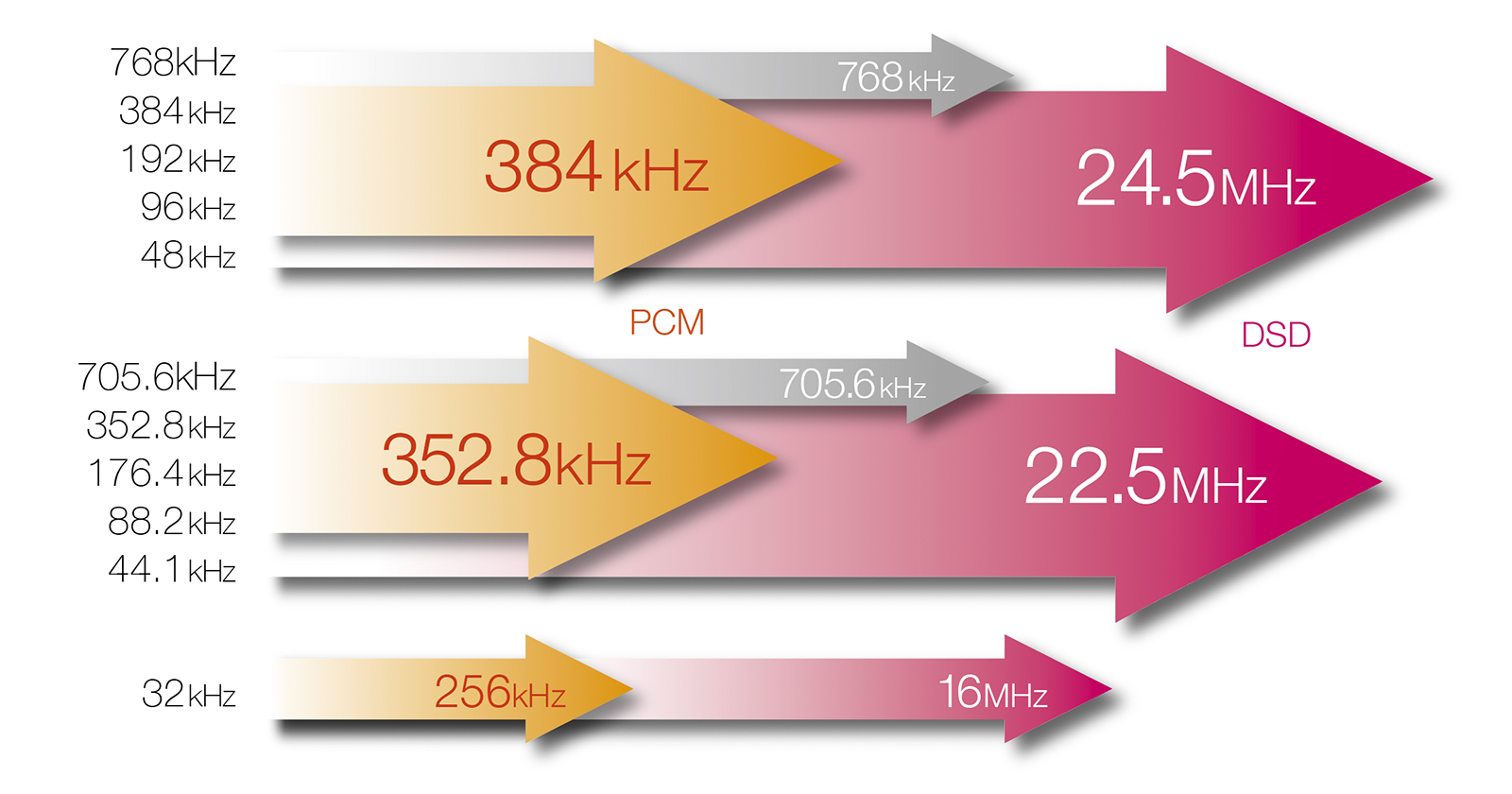
When transferring large volumes of digital data for Hi-Res audio sources through USB cables using conventional isochronous transfer mode, large variations can occur in the processing loads of the sending computer and the receiving USB DAC.
This can cause sound to drop out and other problems to occur. However, with our new USB transmission technology − dubbed Bulk Pet − a fixed amount of data is transmitted constantly, levelling out the processing burden on both devices and contributing to stable data transmission.
Changing the processing burden on the computer directly affects audio quality so users can select the setting they prefer (from four transmission modes).

Seven types of PCM digital filters are available in this model. This allows you to choose the best filter according to the input file format and music style. Since the filter can be changed with a single operation of the included remote control, you can easily enjoy the differences in the subtle sound nuances of each filter type. The unit can also be used with no enabled filters.
The dual monaural theme continues. Two over-sized high-capacity toroidal-core power transformers are employed in the UD-505-X, supplying stable, individual current sources for each of the left and right channels. This means neither channel will be affected by changes in the power consumption of the other during digital processing.
Analog output circuits have been further refined
We employed the TEAC-HCLD 2 for the analog output circuit. This is a further improved version of the TEAC-HCLD circuit enhanced-current output buffer amp that increases crucial current output capacity (HCLD: High Current Line Driver). This model now uses line buffer ICs with extremely high current output capacity. By using a positive-negative two-circuit structure for each channel, drive can be differential with balanced output and parallel with unbalanced output. Transmitting audio signals without degrading their dynamism becomes possible with increased current supply capacity.
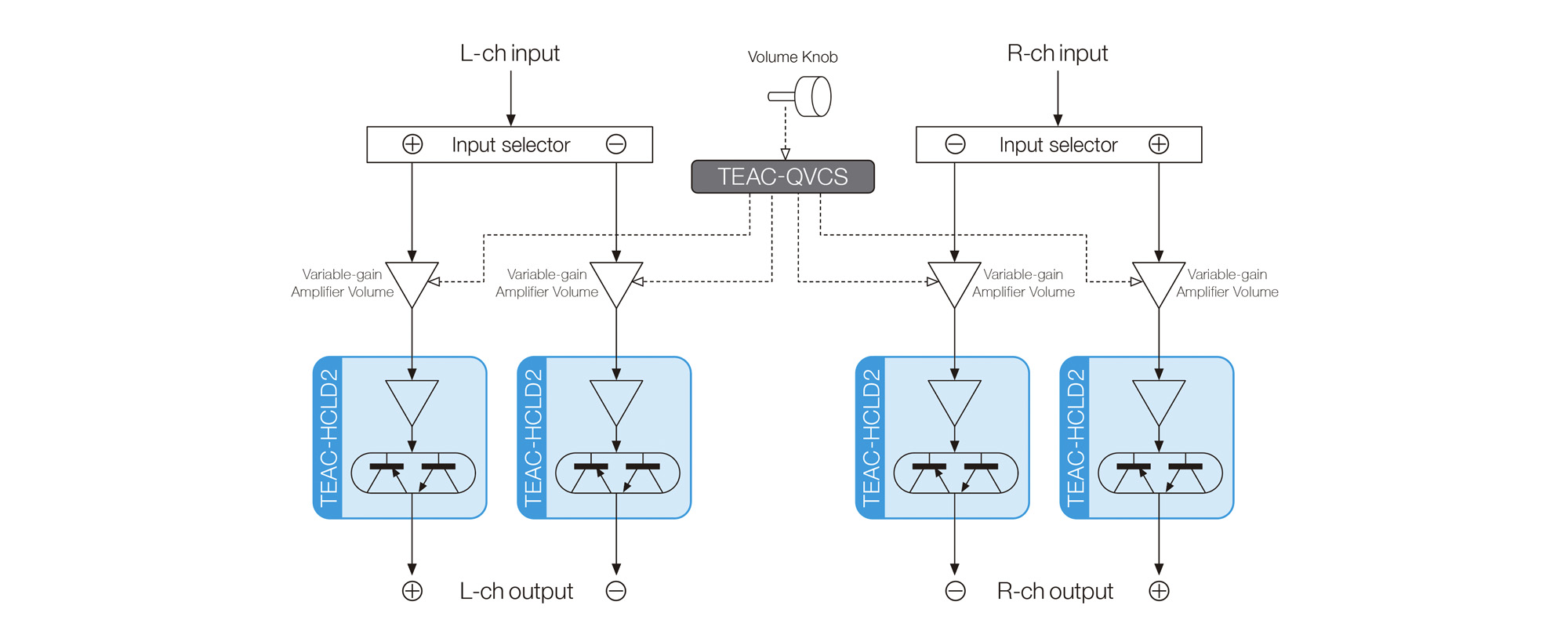
TEAC-QVCS (Quad Volume Control System) is used for the volume circuit. This electronic volume control is a variable gain amp type comprised of four discrete circuits for left, right, positive and negative (L+, L−, R+, R−). By placing the variable gain amp volume control, which processes in analog, in the audio signal path on the circuit board, issues with noise resulting from diverging wiring are avoided.
Furthermore, this TEAC-QVCS enables volume adjustment in 0.5dB increments, allowing you to set the perfect volume for your audio system or headphones.
Designed to bring out the maximum potential of your headphones
The UD-505-X’s headphone amplifier circuit provides balanced-drive by using the TEAC-HCLD2 circuit, − comprised of four output transistors for each left and right channel − for headphone output. With challenging 600Ω high-impedance headphones for example, the UD-505-X allows you to bring out the potential of these type of headphones.
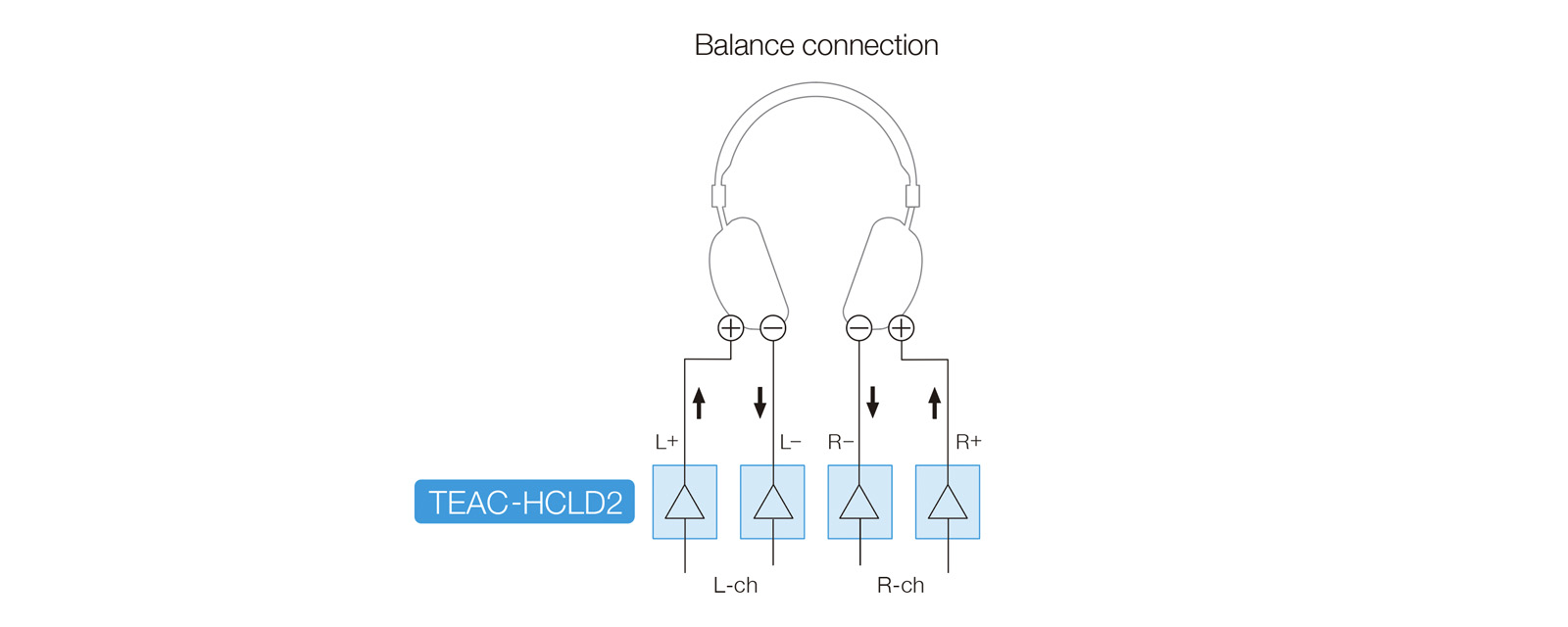
In addition to the dual conventional 6.3mm (¼) TRS jacks for balanced connection, the UD-505-X employs a 4.4mm 5-pole headphone jack for balanced drive. At the 6.3mm TRS jack, you can enjoy 3 kinds of drive type, unbalanced connection to drive up to 2 sets headphones, and active-ground drive that is effective to improve the silence and present the sensitive sound, as well as balanced connection.

The active-ground is a new driving mode that employs the principles of balanced connection. It forcefully drives the ground, by lowering the ground level to 0V, providing an ideal ground condition (rather than just connecting to the conventional ground). This means it also suppresses hum noise from the power supply and enhances the purity of silent pauses by lowering the noise floor. Subtle detail, such as the breathing of artists and the textures of sounds, will feel even more convincing.
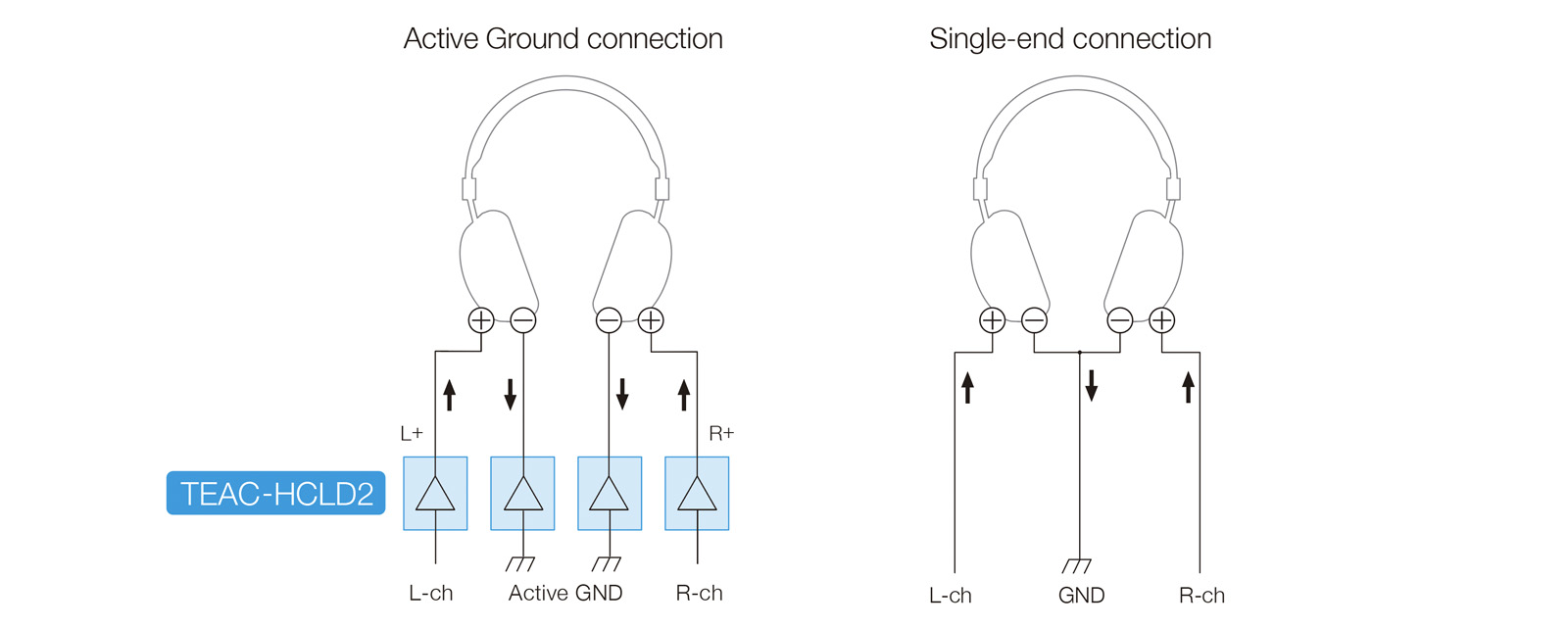
Obsessively well-designed
Since the entire body is constructed from metal panels that are resistant to external noise, intrusion of electromagnetic noise generated by computers and other devices is suppressed. A clean internal environment with little noise has been realized even in conditions that are difficult for audio equipment. Furthermore, 8mm-thick aluminum panels covering both sides of the all-metal chassis provide a strong and stable structure that prevents twisting and bending. Moreover, with the size of an A4 page* (viewed from above), the unit can be placed on a desk, side table or other small space.
* This excludes the connectors, knobs and other protrusions.
The UD-505-X is equipped with both balanced and unbalanced Analog audio outputs. A pair of XLR connectors and another pair of RCA connectors – each gold-plated – are symmetrically laid out, hinting at the dual monaural arrangement inside, and allowing a wide range of possible audio configurations. A wide-spaced pitch layout for the RCA outputs accommodates professional grade plugs with large-diameter shells. The UD-505-X has a total of 5 digital inputs: USB audio, coaxial, optical on the rear panel, and a combination jack on the front panel (for coaxial and optical, supporting PCM 24bit/192kHz and DSD64 (2.8MHz) in DoP format).

Our newly-developed original Stressless Foot design with three support points enables stable placement of the unit so that it is not impacted by slight irregularities in the surface beneath it. Compared to the original feet used in previous designs, these feet are only partially fixed to the chassis. This design was developed based on the concept that by allowing the feet to vibrate freely, more natural sound reverberations could be achieved. The tops of the conical feet, which are made of machined steel, are attached so that they hang from the bottom of the chassis and swing freely when the unit is lifted. While maintaining a sense of placement like that of the pin-point spiked feet used by previous models, this design enables more natural rich reverberations.
A semi-floating structure is newly used for the top panel. It has achieved a sound with an excellent sense of openness.
The next-generation Hi-Res formats, DSD512 (22.5MHz) and PCM 768kHz/32-bit are supported via the TEAC HR Audio Player software for Windows and Mac. This software guarantees the best available playback quality with any combination of audio format and computer configuration via a single USB cable. All the user has to do is choose the UD-505-X from the pull-down menu showing target output devices. The TEAC HR Audio Player is downloadable from TEAC’s web site, and is completely free to use.
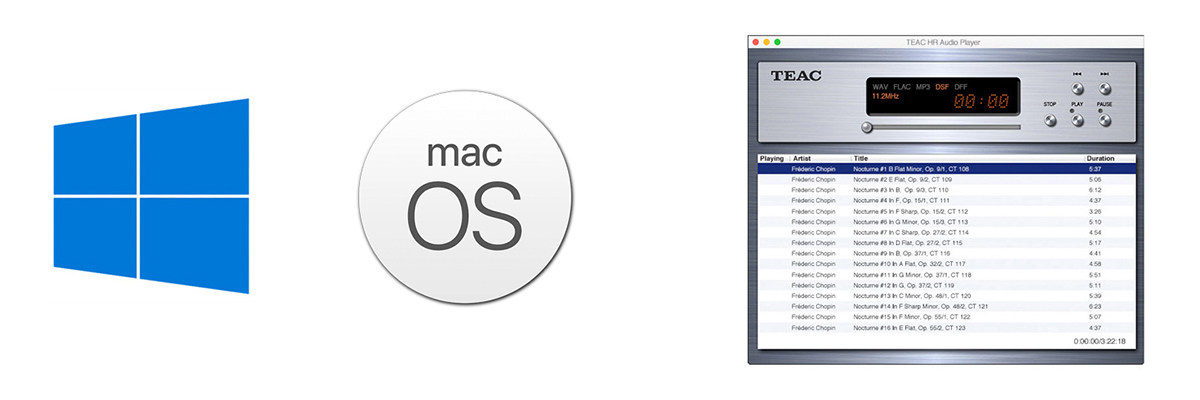
Features at a glance
- Hi-Res audio playback supporting DSD512 (22.5MHz) and PCM 768kHz/32bit PCM
- An ESS Technology ES9038Q2M converter each for left and right channels
- Dual on-board clocks for 44.1kHz and 48kHz frequencies
- 7 types of PCM digital filters
- Up-conversion up to 24.5MHz DSD and 384kHz/32bit PCM
- 10MHz external clock input
- Bluetooth® receiver supporting LDAC™, Qualcomm® aptX™ HD, AAC and SBC
- Original TEAC-HCLD2 enhanced-current output buffer circuit
- Dual monaural circuit design
- Dual toroidal-core power transformers for each channel
- TEAC-QVCS quad volume control system
- 4.4mm 5-polar Pentaconn*1 jack and dual 1/4” (6.3mm) TRS jacks for balanced and active-ground drives
- Full-dot OLED display with dimmer function
- Newly-developed “Stressless Foot” design with three support points
- Semi-floating design Top Panel
- Bulk Pet*2 USB transferring technology with four transfer modes for various sound characters
- Free TEAC HR Audio Player for Windows/Mac
*1 ”Pentaconn” is a registered trademark of NIPPON DICS Co., Ltd., complies with the RC-8141C JEITA standard.
*2 ”Bulk Pet” is a registered trademark of Interface Corporation.
Supported formats
USB input
PCM 16/24/32 bit
44.1k/48k/88.2k/96k/176.4k/192k/352.8k/384k/705.6k/768k Hz
DSD 2.8M/5.6M/11.2M/22.5M Hz
Coaxial digital input
PCM 16/24 bit
32k/44.1k/48k/88.2k/96k/176.4k/192k Hz
DSD 2.8MHz(supported with 176.4kHz/24-bit DoP format)
Optical digital input
PCM 16/24 bit
32k/44.1k/48k/88.2k/96k/176.4k/192k Hz
DSD 2.8MHz(supported with 176.4kHz/24-bit DoP format)
DAC section
USB DAC ESS Technology ES9038 Q2M ×2
Up-conversion up to 384kHz/32-bit PCM, 24.5MHz DSD
Audio inputs
USB USB B port, USB 2.0, asynchronous mode transfer, bulk transfer
Compatible Software TEAC HR Audio Player (Windows, Macintosh)
COAXIAL digital (rear) RCA pin ×1 (gold-plated)
Input level 0.5Vp-p
Input impedance 75Ω
Optical digital (rear) TOS-link ×1
Input level -24.0 to -14.5dBm peak
Coaxial digital (front) 1/8” (3.5mm) mini* ×1 (combined with optical digital input, detected automatically)
Input level 0.5Vp-p
Input impedance 75Ω
* 1/
Informații suplimentare
| Producător | |
|---|---|
| Disponibilitate | În Stoc Furnizor * Verificati disponibilitatea produsului! |
| Unitate Pret | Bucata |
Explicatii in ceea ce priveste rodajul echipamentelor, cat si al cablurilor, asezarea optima a echipamentelor in camera de auditie, importanta acusticii camerei si nu in ultimul rand sistemul de alimentare a intregului echipament:
PENTRU BOXE:
- Pentru performante optime este necesara pozitionarea boxelor la o distanta de minim 30-40cm de peretele din spate pentru boxele cu bass-reflex in spate, pentru cele cu bass-reflex in fata, recomandam pozitionarea la o distanta de 10-20cm fata de peretele din spate, dar totodata la o distanta de cel putin 50cm fata de peretii laterali. Tineti cont de faptul ca orice piesa de mobilier din incapere, joaca rol de absorbtie fonica, dar si de difuzie fonica daca acestea din urma sunt din materiale ceramica sau oglinzi, geamuri sau alt material reflectorizant. In acest sens, gasiti pe blogul nostru, multiple articole care va pot ajuta
- Boxele vor ajunge sa functioneze in parametrii recomandati de producator, dupa minim 50 de ore (ideal 100 ore) de functionare la volum mediu. In aceasta perioada de timp, de “rodaj a boxelor”, sunetul va fi la inceput mai artificial, bass-ul nu va fi inca controlat, inaltele rigide iar vocile usor retinute, pe masura ce boxele vor functiona, veti remarca cum bas-ul devine mai controlat, mai prezent si mai voluminos, vocile si sunetele medii devin naturale si mai echilibrate, iar inaltele devin rafinate si detaliate. Exista boxe care necesita un „rodaj” mai amplu de minim 300 de ore mai ales in cazul celor care au difuzoare de kevlar, carbon sau alte materiale de acest tip. Boxele care se „rodeaza” cel mai repede sunt cele care au difuzoare de celuloza.
Imbunatatirea sunetului unui sistem audio stereo (Partea I)
Imbunatatirea sunetului unui sistem audio stereo – (Partea II)
PENTRU AMPLIFICATOARE, DAC-URI, PREAMPLIFICATOARE, RECEIVER STEREO & HOME CINEMA, SURSE DIGITALE AUDIO-VIDEO:
- Pentru performante optime este necesar „rodarea” echipamentului, In functie de complexitatea componentelor din aparatul dumneavoastra acesta poate dura intre 30-200 ore.
- Rodajul se face la volum minim, fiind astfel suficient faptul ca acesta este alimentat corect conform manualului de utilizare la 220-230 Volti si trece semnal audio sau video dupa caz prin el.
- Echipamentul supus „rodajului” va ajunge sa functioneze in parametrii recomandati de producator, dupa perioada mai sus mentionata. In aceasta perioada de timp, de “rodaj”, sunetul va fi la inceput ceva mai artificial, bass-ul nu va fi inca controlat, inaltele rigide iar vocile usor retinute, pe masura ce echipamentul va functiona, veti remarca cum bas-ul devine mai controlat, mai prezent si mai voluminos, vocile si sunetele medii devin naturale si mai echilibrate, iar inaltele devin rafinate si detaliate.
- In ceea ce priveste echipamentul video precum videoproiector, TV, media player, blueray player, necesita un "rodaj" de cel putin 50 de ore. Lipsa acestuia nu va poate oferi maxim de performanta. "Rodajul" se efectueaza prin simpla utilizare a acestuia, intr-un mod conform specificatiilor mentionate de producator.
PENTRU CABLURI:
- Pentru performante optime este necesara „rodarea” cablurilor, In functie de complexitatea conductorului folosit, cat si geometriei acestuia, „rodajul” poate dura intre 30-100 ore.
- Rodajul se face la volum minim, fiind astfel suficient faptul ca va trece semnal audio sau video dupa caz prin el.
- Cablul supus „rodajului” va ajunge sa functioneze in parametrii recomandati de producator, dupa perioada mai sus mentionata. In aceasta perioada de timp, de “rodaj”, sunetul va fi la inceput ceva mai artificial, pe masura ce cablul va functiona, veti remarca cum bas-ul devine mai controlat, mai prezent si mai voluminos, vocile si sunetele medii devin naturale si mai echilibrate, iar inaltele devin rafinate si detaliate.
Articole indrumatoare:
Tratamentul Acustic si Izolarea Fonica
Pentru un sistem echilibrat, trebuie tinut cont pe langa asezarea corecta a boxelor in incapere, al echipamentelor, sistemul de alimentare al acestora, tinand cont de instalatia electrica a locatiei.
Pentru detalii privind aceste aspecte de rodaj si nu numai, va rugam sa ne consultati!

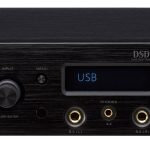
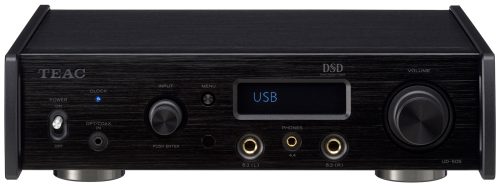

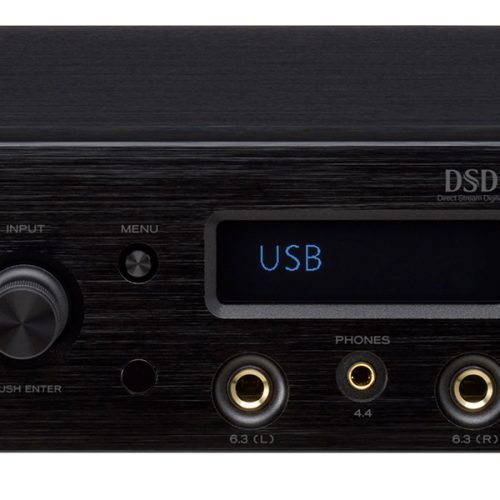

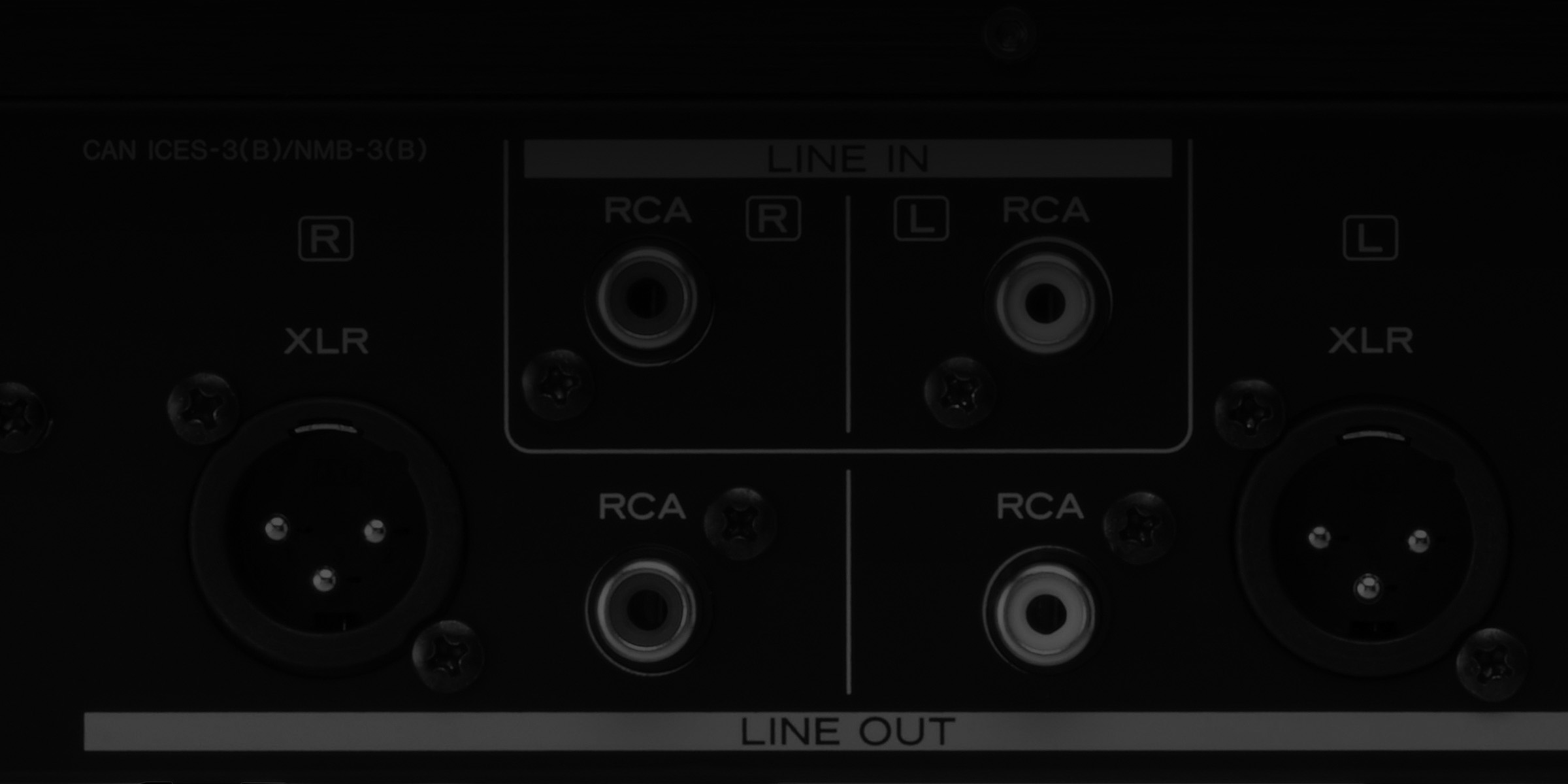
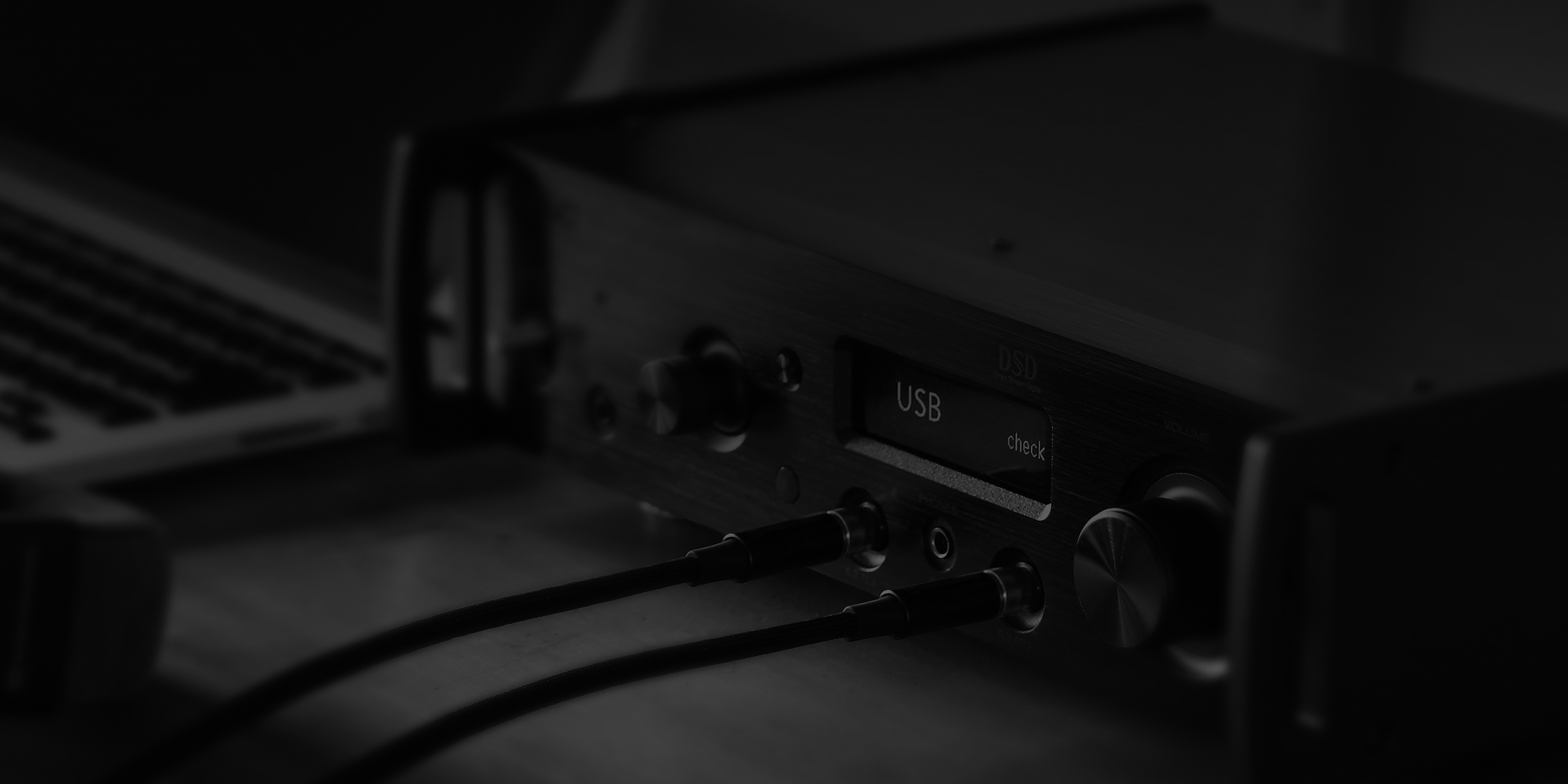
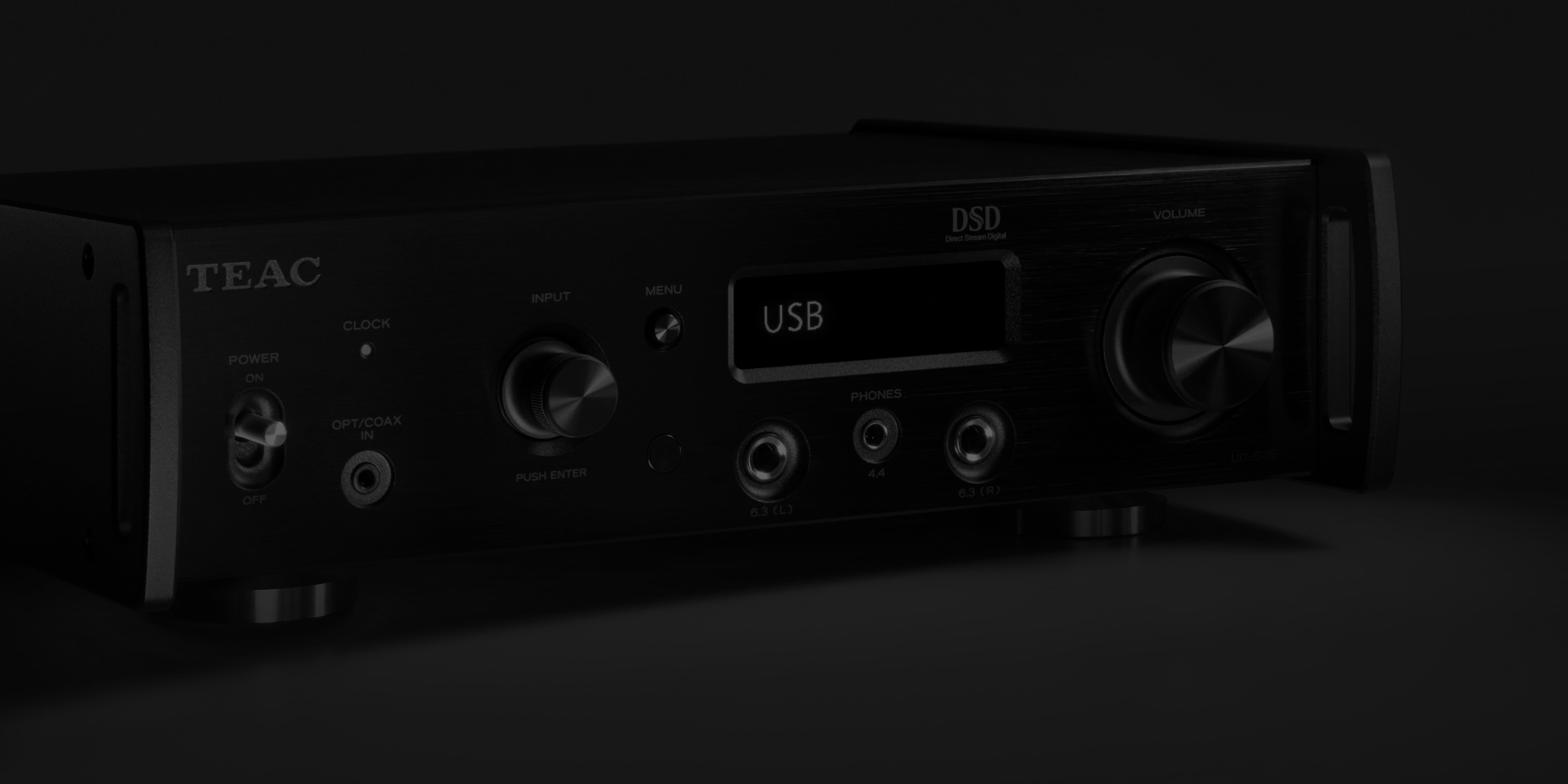
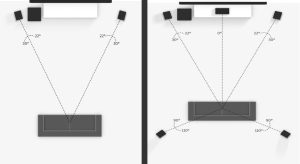
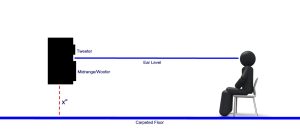
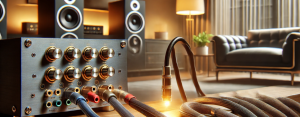





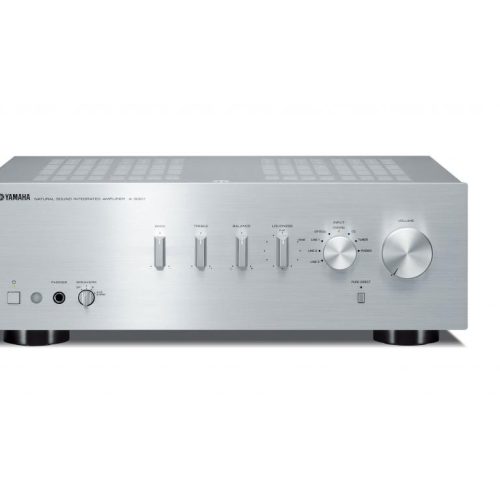
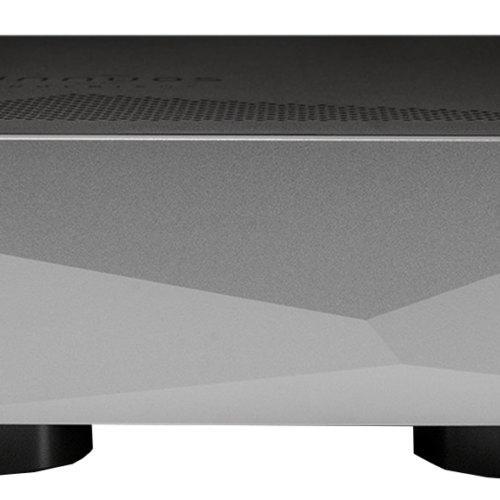




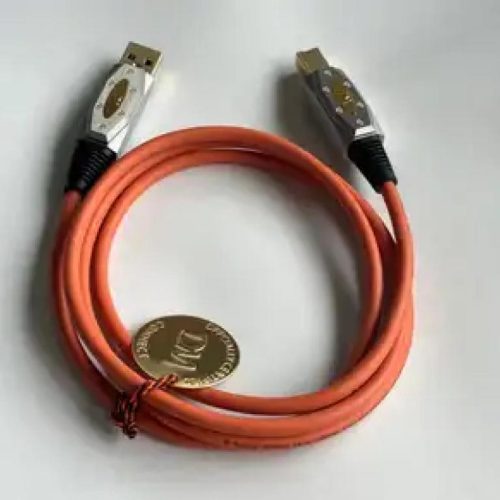
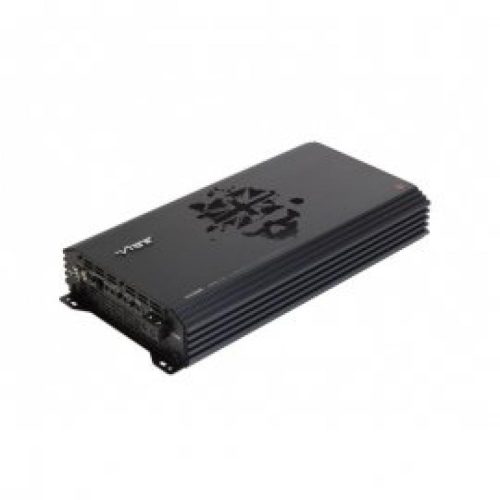
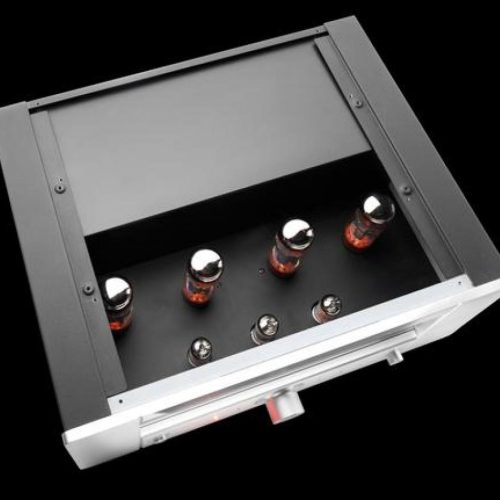

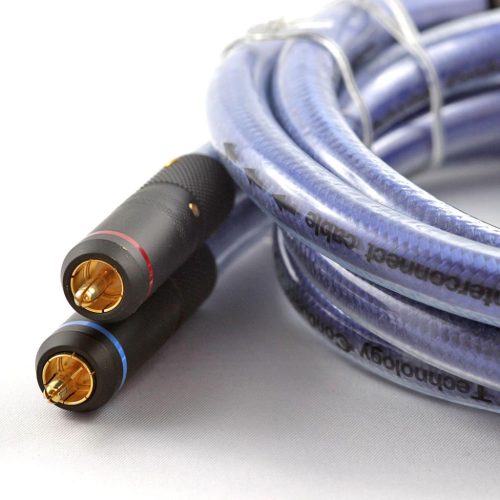
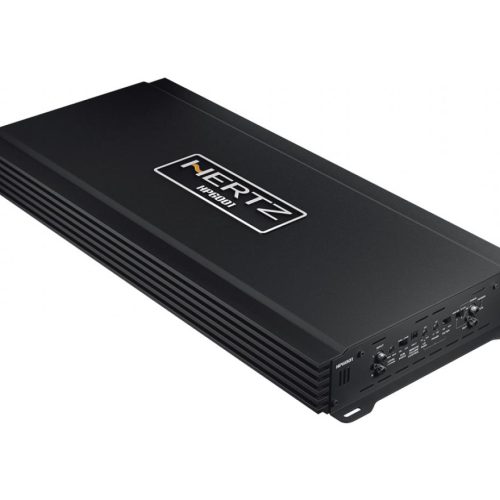

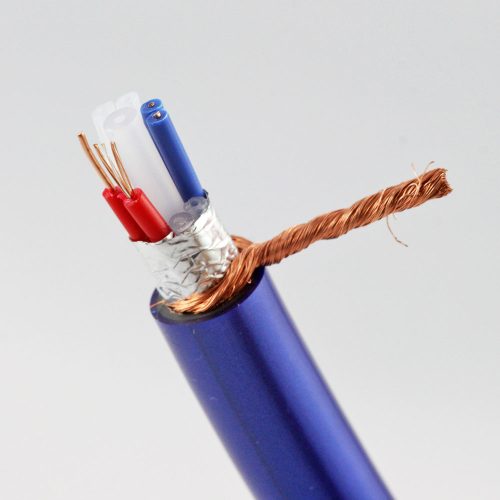




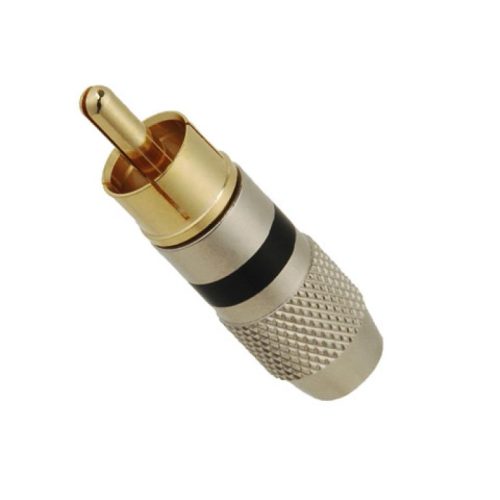
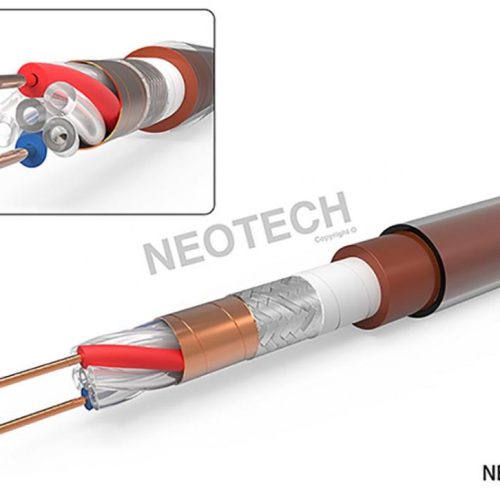

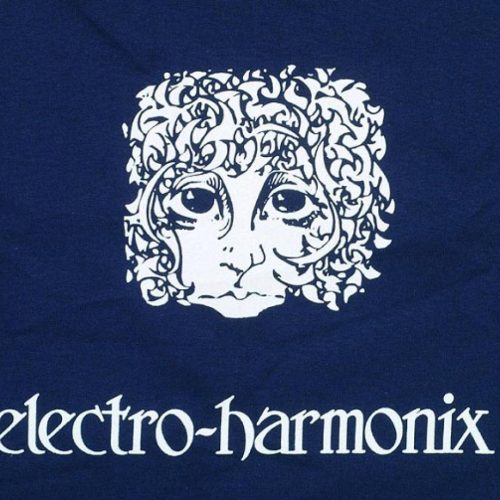

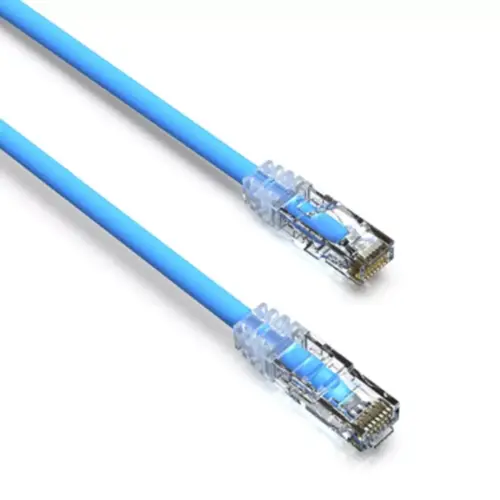
Recenzii
Nu există recenzii până acum.